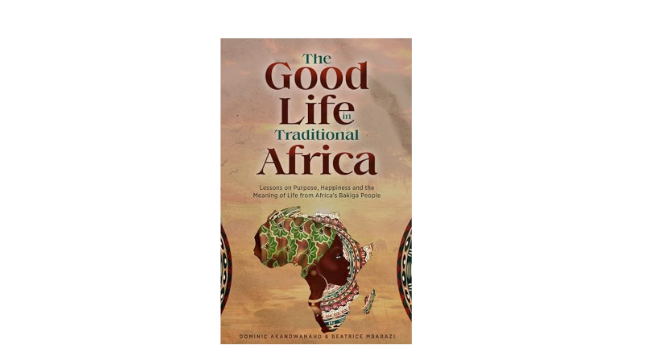Lessons on Purpose, Happiness, and the Meaning of Life from Africa’s Bakiga People
In this beautifully written and well-paced book, The Good Life in Traditional Africa, Dominic and Beatrice take us back to the traditional way of life in Africa’s Bakiga community, where wisdom was passed down orally. Surprisingly, though never written down, this age-old wisdom was effectively transmitted from one generation to the next, offering young people practical guidance for navigating life.
In today’s digital world, we are overwhelmed by an excess of information, much of it unfiltered and difficult to assess for relevance or accuracy. This book thoughtfully curates traditional knowledge, organizing it into clear, relevant themes. At the end of the book, readers will also find a rich collection of proverbs that, while not categorized, offer powerful insights in their own right.
The Good Life in Traditional Africa is written in a clear and simple style, making it an easy and enjoyable read. It enriches readers with powerful proverbs set against the backdrop of rural Kabale. Among the Bakiga, the art of conversation and the oral transmission of wisdom are highly regarded. As Chinua Achebe once said, "Proverbs are the palm oil with which words are eaten," and this book beautifully reflects that ethos.
From the very beginning, the book captivates the reader through short chapter introductions that highlight the intent and context behind each proverb. For example, in Chapter One, Dominic and Beatrice explore how to navigate human relationships, acknowledging that these are often complicated by rivalry and contradictions.
Now, you might assume that this book is simply a random collection of Bakiga proverbs found on the internet—but that would be a mistake. Dominic and Beatrice's deep interest in exploring and retelling Africa’s cultural history is evident throughout. The book offers intimate and thoughtful analyses of each proverb, leaving the reader with a clear understanding of their meanings and relevance.
From proverbs about human relations to those touching on desire and motivation, the authors have produced a thoroughly researched and insightful work. One proverb that particularly caught my attention was:
“Atarakwenda tarahurira ebyevugo byawe”
This highlights a truth about human relationships: those who don’t like with you are unlikely to celebrate your successes. Thus, it teaches us to be humble and share our victories only with those who genuinely support us.
This proverb resonated with wisdom I once received from a therapist: “There’s nothing you can do to make someone like you. Similarly, there’s nothing you can do to make someone who likes you hate you.” In other words, if someone harbors resentment or jealousy toward you, broadcasting your success will only deepen that negative feeling—sometimes to dangerous extents. Jealousy can lead to harm, even violence. Therefore, be mindful of where and with whom you share your wins.
Another memorable proverb from the book is:
“Nywana bingi oyesige bakye”
This loosely translates to: “Be friends with many, but trust only a few.”
It highlights the complexities of human relationships and advises caution in choosing whom to trust.
Reading this proverb helped me appreciate the importance of keeping a small circle of trustworthy friends. Even true friends may experience moments of jealousy—that’s human—but they will ultimately choose to support you. In contrast, false friends may celebrate you outwardly while harboring resentment.
The book doesn’t shy away from honest and sometimes uncomfortable truths. Take, for instance, this striking proverb:
“Tokayanga omwana okakunda nyina”
Translated: “You cannot hate a child and love its mother.”
This proverb reveals the human tendency to pretend in relationships. It reminds us that genuine love involves embracing a person fully—you cannot claim to love part of someone while hating another part they are deeply connected to.
The Good Life in Traditional Africa stands out as a modern literary tribute to traditional African wisdom. Dominic and Beatrice use a consistent, personal narrative voice that gives the impression that the authors are speaking directly to the reader. For those who know the authors personally, their tone and sincerity come through clearly.
The book is also well-organized. Proverbs are grouped under relevant themes, making it easy for readers to locate proverbs based on topics of interest. However, the final segment of the book contains proverbs that are not categorized. While the authors explain that these could not fit under existing themes, the lack of consistency slightly detracts from the book’s otherwise structured format. Creating a general or “miscellaneous” theme might have preserved organizational coherence.
Whether you're seeking timeless wisdom, light reading, or conducting research on African traditions, The Good Life in Traditional Africa is a valuable resource. It is suitable for readers of all ages, across different cultures and backgrounds. Though grounded in Bakiga traditions, the insights offered are universal, making this book both educational and profoundly relatable.
Leave a Comment
Sign in or become a Africa Rebirth. Unearthing Africa’s Past. Empowering Its Future member to join the conversation.
Just enter your email below to get a log in link.


Related News
Book Review: A History of Bunyoro Kitara by A.R Dunbar
Jan 25, 2026
Combatants: A Memoir of the Bush War and the Press in Uganda by William Pike
Nov 21, 2025
Book Review: Season of Migration to the North by Tayeb Salih
Sep 28, 2025